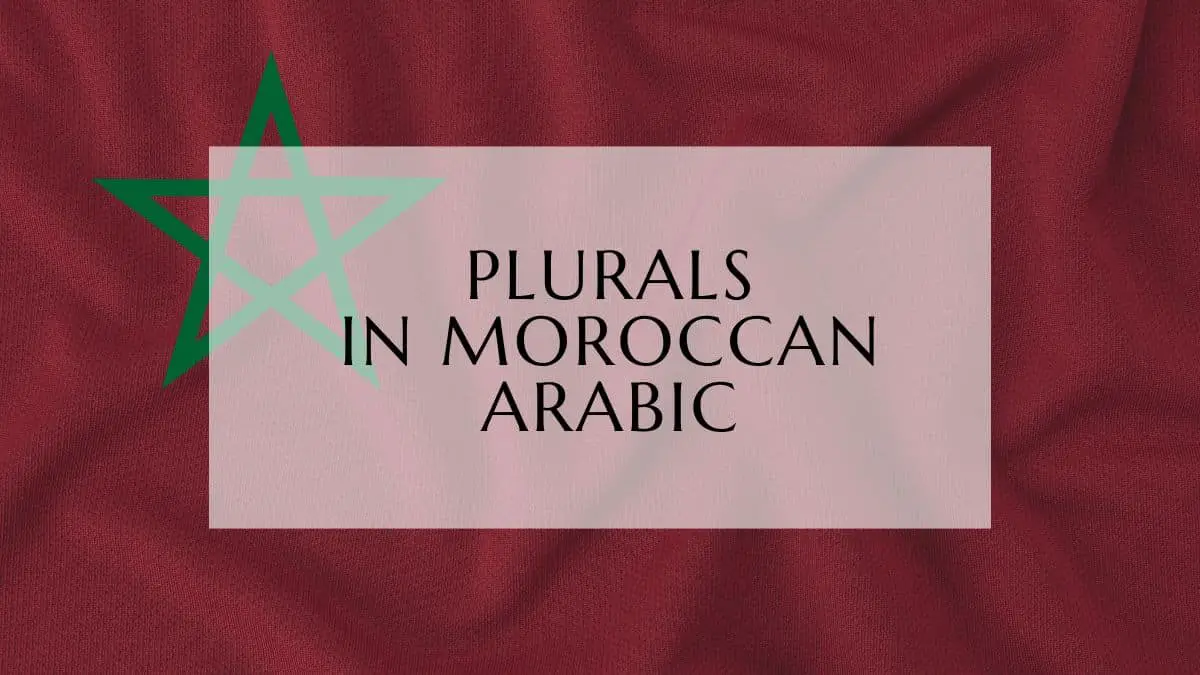In this lesson, we will talk about the plurals in Moroccan Arabic, how to form them, and some irregular forms.

Plurals in Moroccan Arabic
The Regular Plurals
To form the plural, we add the suffix “in” to the end of the masculine word, and “at” to the end of the feminine one.
| English | Masculine Singular | Masculine Plural |
| Actor | Momettil ممتل | Momettilin ممتلين |
| Engineer | Mohendis مهندس | Mohendisin مهندسين |
| Athlete | Riyadi رياضي | Riyadiyin رياضيين |
| Inspector | Mufettish مفتش | Mufettishin مفتشين |
| Journalist | Sa7afi صحفي | Sa7afiyin صحفيين |
| Lawyer | Mo7ami محامي | Mo7amiyin محاميين |
| Painter | Ressam رسام | Ressamin رسامين |
| Translator | Moterjim مترجم | Moterjimin مترجمين |
| Blue | Zrq زرق | Zrqin زرقين |
| Purple | Banafsaji بنفسجي | Banafsajiyin بنفسجيين |
| Yellow | Sfr صفر | Sfrin صفرين |
For feminine:
| English | Feminine Singular | Feminine Plural |
| Actress | Momettila ممتلة | Momettilat ممتلات |
| Engineer | Mohendisa مهندسة | Mohendisat مهندسات |
| Athlete | Riyadiya رياضية | Riyadiyat رياضيات |
| Inspector | Mufettisha مفتشة | Mufettishat مفتشات |
| Journalist | Sa7afiya صحفية | Sa7afiyat صحفيات |
| Lawyer | Mo7amiya محامية | Mo7amiyat محاميات |
| Painter | Ressama رسامة | Ressamat رسامات |
| Translator | Moterjima مترجمة | Moterjimat مترجمات |
| Blue | Zrqa زرقة | Zrqat زرقات |
| Purple | Banafsajiya بنفسجية | Banafsajiyat بنفسجيات |
| Yellow | Sfra صفرة | Sfrat صفرات |
Note: for words ending with “i” we add “y” before the suffix: banafsaji (purple, singular): banafsajiyin (purple, masculine, plural)
Adjectives
It’s common to use the masculine plural form of adjectives, for feminine as well.
Examples:
White refrigerators: tellajat bydin, you will rarely find someone saying “tellajat bydat”
Beautiful cars: tonobilat zwinin
Note: you can practice what you’ve learned here, and learn how to pronounce each of the words in our Memrise course here, don’t know how to use the platform or sign up? we’ve got you covered in this easy-to-follow tutorial here.
The Irregular Plural
Also called “the broken plural”, there are no rules for them, so I made this list to help you with some of them:
| English | Singular | Plural |
| Baker | Khebbaz (m) خباز Khebbaza (f) خبازة | Khebbaza خبازة |
| Big | Kbir كبير | Kbar (m and f) كبار Kbarat (f) كبارات |
| Book | Ktab كتاب | Ktuba كتوبة |
| Cheap | Rkhis رخيص | Rkhas (m, f) رخاص |
| Cook | Tebbakh طباخ | Tebbakha (m, f) طباخة Tebbakhat (f) طباخات |
| Dear | 3ziz عزيز | 3zaz (m,f) عزاز 3zizat (f) عزيزات |
| Dumb | Ghabi غبي | Aghbiya (m,f) أغبياء |
| Far | B3id بعيد | B3ad (m,f) بعاد B3adat (f) بعادات |
| Heavy | Tqil تقيل | Tqal (m,f) تقال Tqalat (f) تقالات |
| Innocent | Bari2 بريء | Abriya2 (m,f) أبرياء |
| Jealous | Meghyar مغيار | Meghyara (m,f) مغيارة Meghyarat (f) مغيارات |
| Judge | Qadi قاضي | Qodat (m,f) قضاة |
| Man | Rajel راجل | Rjal رجال |
| New | Jdid جديد | Jdad (m,f) جداد Jdadat(f) جدادات (less used) |
| Old | Qdim قديم | Qdam (m,f) قدام |
| Professor (m) | Ostad أستاذ | Asatida أساتذة |
| Professor (f) | Ostada أستاذة | Ostadat أستاذات |
| Short | Qsir قصير | Qsar (m,f) قصار Qsarat (f) قصارات |
| Sick | Mrid مريض | Mrad (m,f) مراض |
| Small | Sghir صغير | Sghar (m,f) صغار Sgharat (f) صغارات |
| Tall | Twil طويل | Twal (m,f) طوال |
| Woman | Mra مرا | 3yalat عيالات |
| Writer | Katib كاتب | Kuttab كتاب |
Note: As we have just seen in the previous section about the plural of adjectives, you can use the masculine plural for both masculine and feminine (m, f) yet I included the feminine form in case you wanted to use them anyway or were curious about them.
Happy learning!
